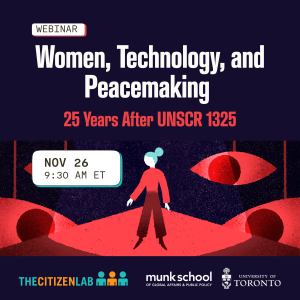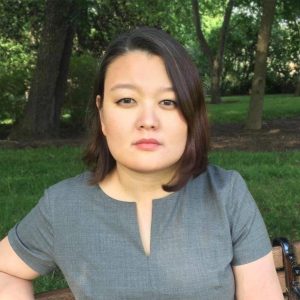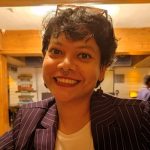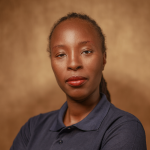Date: November 26, 2025
Time: 9:30 am – 11:00 am ET / 3:30 pm – 5:00 pm CET
Location: Online (Zoom webinar)
REGISTER

This year marks the 25th anniversary of UN Security Council Resolution 1325, a milestone recognizing women’s essential roles in peacemaking, conflict prevention, and post-conflict recovery. Yet, as the world celebrates this legacy, new realities challenge its celebration.
Digital technologies, once seen as tools for empowerment, have become instruments of surveillance, disinformation, and harassment, used by patriarchal and authoritarian actors to silence women human rights defenders and peacebuilders. Digital threats such as the hacking of devices, the exposure of private information and online abuse expand the spectrum of violence against women, creating new forms of insecurity. Even in exile, women with ties to authoritarian countries face gender-based digital transnational repression (GDTR) that aims to intimidate and silence them across borders.
This webinar brings together Citizen Lab researchers with policy advisors, Women, Peace and Security (WPS) experts, and human rights defenders to reflect on 25 years of the WPS agenda in the age of digital repression. The discussion will explore how gender, technology, and authoritarianism intersect to shape women’s participation in peace and security, and how targets of gendered digital attacks and feminist movements are building resilience and reimagining women’s digital security for the next 25 years.
Join us for a timely conversation on how digital repression and surveillance are reshaping women’s participation in peacebuilding and the Women, Peace and Security agenda.
Meet the Speakers
KEYNOTE

Lara Scarpitta (she/her) is the OSCE senior Advisor on Gender Issues and Head of the Gender Issues Programme in the Office of the Secretary General; Senior Advisor and former Political Advisor on Peace, Mediation and Gender at the EU Delegation to the United Nations in Geneva.
MODERATOR

Urooj Mian, MSc., LL.M (she/her) is the CEO at Sustainable Human Empowerment (SHE) Associates. She holds a Master in Law (LL.M) in International Crime and Justice from the United Nations Interregional Crime Research Institute (UNICRI) and University of Torino, a Master in Social Science (M.Sc) in Peace and Conflict Research, from Uppsala University in Sweden, and a Bachelor of Public Affairs in Policy Management (B.PAPM) specializing in Human Rights and Law from Carleton University. She is respected as a gender, peace and security expert internationally and regularly works with human rights defenders. She holds a combination of experience as a life-long activist, a policy-maker, and a founding executive director of a national advocacy-focussed not-for-profit forwarding the Women Peace and Security agenda. Urooj is currently the CEO at Sustainable Human Empowerment (SHE) Associates. A boutique consulting firm headquartered in Canada with a mission to empower sustainable impact and enable transformative change in the areas of gender equality, peace and justice worldwide.
PANELLISTS

Noura Aljizawi (she/her) is a senior researcher at the Citizen Lab. Her research focuses on digital authoritarianism, disinformation, and digital transnational repression, informed by her background in human rights activism during the Syrian uprising. Aljizawi holds a Master’s degree in Global Affairs from the University of Toronto and has been recognized for her work in online safety and digital security.

Marcus Michaelsen (he/him) is a senior researcher at the Citizen Lab focusing on digital threats against exiles and diaspora communities. Previously, he was a senior post-doctoral researcher in the research group on Law, Science, Technology and Society at Vrije Universiteit Brussel. He has also held a senior information controls fellowship with the Open Technology Fund, and has worked as a lecturer and postdoc researcher in the Political Science Department of the University of Amsterdam. He holds a PhD in Media and Communication Studies from the University of Erfurt in Germany.

Siena Anstis (she/her) is a senior legal advisor at the Citizen Lab. Prior to joining Citizen Lab, she worked as a litigation associate at Morrison & Foerster in New York City and clerked for the Hon. Justice Cromwell at the Supreme Court of Canada and at the Court of Appeal for Ontario. Anstis holds a B.A. in Journalism and Anthropology from Concordia University, a Bachelor of Laws/Bachelor of Civil Law from McGill University, and a Master of Laws from the University of Cambridge.

Natalia Arno (she/her) is the president and founder of Free Russia Foundation. She is a prominent fighter for the advancement of democracy, human rights, and freedom. From 2004 to 2014, Ms. Arno worked for the International Republican Institute’s (IRI) Russia office. For her work in support of human rights and civil society in Russia, in 2012, Ms. Arno was given an ultimatum by Putin’s security services— to leave her homeland in 48 hours or face 20 years in prison on treason charges. Ms. Arno resolved to continue her fight and, in 2014, she created Free Russia Foundation (FRF) to serve as a platform for pro-democracy Russians. FRF provides support to civil societies of Russia and Belarus and has programs to assist Ukraine. FRF is a powerful global movement with centers in Washington, DC and Brussels; Kyiv, Ukraine; Berlin, Germany; Vilnius, Lithuania and Paris, France.

Sreshtha Das (they/them) is a queer disabled activist and works as a Gender Advisor/Researcher at Amnesty International. At Amnesty they developed the ‘Make It Safe Online for women, girls and LGBTI people’ project, which looks at technology-facilitated gender-based violence (TfGBV) through an intersectional and decolonial lens in different country contexts. Their work has largely been at the intersection of gender, sexuality, SRHR, militarisation and racial justice with various marginalised groups, using a structural and systemic analysis to holistically address social justice issues.

xeenarh Mohammed (she/her) is a global leader at the intersection of technology, human rights, and governance, with over a decade of experience advancing equity and accountability in digital spaces. She currently serves as Co-Lead of the Digital Defenders Partnership, where she oversees global strategy and operations supporting human rights defenders across Africa, Asia, Latin America, and Europe.
About UNSCR 1325
The United Nations Security Council (UNSC) adopted resolution (S/RES/1325) on women, peace and security on October 31, 2000. UNSCR 1325 calls for women’s meaningful participation in peace and security processes; however, 25 years later, the world faces new and complex realities that challenge the spirit of this resolution. Digital technologies have introduced new forms of communication and alternative public spaces. They have also become tools of surveillance, control, harassment, and violence in the hands of patriarchal, authoritarian, and militarized powers.
The widespread use of mercenary spyware, targeted digital surveillance, online harassment, and disinformation campaigns has created an environment in which women journalists, human rights defenders, and peacemakers are systematically targeted. These technologies enable state and non-state actors to extend gender-based violence beyond physical spaces and into the digital sphere. Even when women are in exile, digital technology enables harmful actors to threaten and silence women from afar.
While the international community celebrates the progress made on the WPS agenda, women who engage in peacebuilding and human rights work still face multi-layered forms of violence that are simultaneously gendered, political, and technological.This webinar situates these realities within an intersectional feminist framework, recognizing that women from marginalized communities, including those defined by race, ethnicity, sexuality, class, religion, or migration status, experience compounded forms of exclusion and vulnerability. Understanding how these intersecting systems of power operate in digital environments is essential to advancing an inclusive and transformative WPS agenda for the next 25 years.

